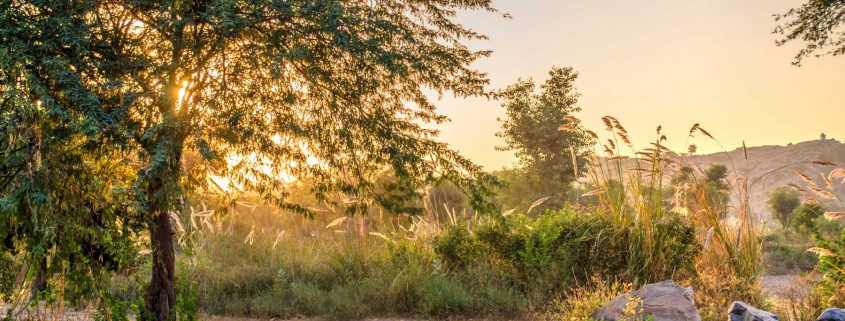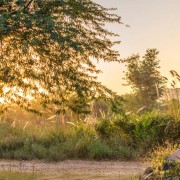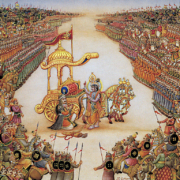CELEBRATE!!! Asta Sakhis’ Birthdays (Janma Utsava)
Mahanidhi Swami
What is an Utsava?
Every year, Radha-Krishna’s devotees celebrate many kinds of festivals (aka utsava) of varying sizes called either utsava, maha utsava or maha maha utsava. In Sanskrit, the word utsava means a festival or celebration that gives happiness to all.
Especially held in honor Bhagavan Sri Krishna and His devotees, an utsava will typically include these features: flower petals and garlands, gates, decorations, and sprinkling sandal-scented water; special gorgeous dresses, offerings and worship of Radha and Krishna; music with many kinds of instruments like karatala, mrdanga, horns, flutes, bells, gongs and conches; harinama sankirtana with euphoric dancing; hearing Govinda lila-katha, enthusiastic maha-prasada seva; and meeting with devotees—sharing hearts, aspirations and Krishna-katha.
Bhagavan Sri Krishna personally describes how to observe a mahotsava for the pleasure of one’s cherished Thakuraji, “During a mahotsava, devotees should become absorbed for some time in singing along with other devotees, chanting loudly and dancing, acting out My transcendental pastimes, and hearing and telling stories about Me.” (SB 11.27.44)
One devotee said, “A festival means plans, preparations, creativity, color, smells and surprises. It means friends—giving, receiving and sharing; along with lots of singing, dancing, playing and merrymaking—ALL for the pleasure of Thakuraji.”
One Vrajavasi said, “Utsava means an enjoyable festival of bliss by seeing Radha Ramanaji, singing, dancing and feasting on His maha-prasada!”
I definitely agree with this!
Types of Utsavas
Gaudiya Vaisnavas observe all kinds of spiritual celebrations including even a “mango eating” festival (Amotsava). Srila Krishnadasa Kaviraja explains, “Every day for twelve months, Lord Gauranga performed kirtana, and held a mango-eating festival with His bhaktas, bara masa kirtana avasane, amra mahotsava prabhu kare dine dine.” (Cc. 1.17.88)
Here is a list of some joyous celebrations: birth, janmotsava (Sri Krishna Janmotsava and Nandotsava; Krishna’s dancing with gopis, Rasotsava; swinging festival, Dolotsava; chipped rice and sweet yogurt, Cida-Dadhi Mahotsava; bathing Sri Jagannathaji, Snana-yatra Mahotsava; beholding a youthful Jagannathaji, Netrotsava; Lakshmi coming to see Jagannatha Swami, Hera Panchami Mahotsava; lighting hundreds of ghee lamps, Deepavali Mahotsava; offering Giriraja a mountain of grains, Annakuta Mahotsava; name giving, nama karana mahotsava; marriage, vivahotsava; disappearance day, tirobhava mahotsava; and a super big blissful Harinama festival, maha maha utsava sankirtana range.
One can even hold a daily super grand festival of bliss, as Sri Advaita Prabhu did when Mahaprabhu visited him in Shantipura, prati-dina kare acarya maha mahotsava. (Cc. 2.3.201)
Beside all the wonderful benefits, one will derive from observing the festivals described above, Srila Rupa Goswamipada says, “If one celebrates festivals in the temple of Lord Hari, then such a person’s festivals will be forever celebrated in the realm of Lord Hari [as a result], bhavati nityam hari-loke mahotsavah.” (Brs. 1.2.220)
Considering all these points, devotees can also observe wonderful festivals of bliss, mahotsavas, to honor the most auspicious appearance days of Srimati Radharani and Her beloved asta-sakhis. Their avirbhava tithis are listed here for your observance.
Sakhi Janmotsavas 2016
August 14: Lalita-sakhi, Shravana shukla ekadasi (see below too)
September 2: Ranga & Sudevi-sakhis, Bhadra shukla ekam
September 4: Tungavidya-sakhi, Bhadra shukla tritiya
September 6: Indulekha-sakhi, Bhadra shukla panchami
September 8: Campakalata & Lalita-Sakhis, Bhadra shukla saptami
September 9: Sri Radhastami & Visakha-sakhi, Bhadra shukla ashtami
October 4: Chitra-sakhi, Ashwina shukla tritiya.
Ashta-sakhi shiromani, Radhe! Radhe! Jai Jai Sri Radhe!






Leave a Reply
Want to join the discussion?Feel free to contribute!